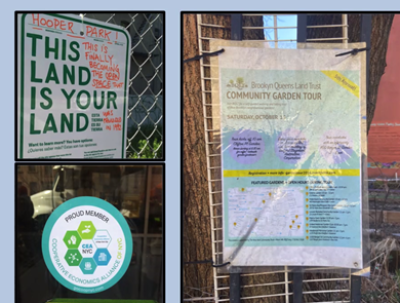The Movement Space of New York’s Solidarity Economy

On Wednesday 30 September 2020, Community Economies Research Network (CERN) member Lauren Hudson presented a webinar, sponsored by the Society of Woman Geographers, entitled “‘An Ensemble of Possibilities’: Enunciating the Geography of New York City's Solidarity Economy.”
The presentation was based on Hudson’s doctoral research in which she explored how a ‘movement space’ is being created by those who work in New York’s solidarity economy, an economy in which economic activities such as production and exchange of goods and services draw on values of social justice, ecological sustainability, cooperation, mutualism and democracy.
The research used an ethnographic approach and incorporated interviews and sketch maps from participants who work in the solidarity economy in New York including in food cooperatives, community land trusts, credit unions, mutual aid organizations, community gardens and housing cooperatives.
Hudson’s research found that history played a role in the production of a solidarity economy movement space with key historical moments, such as the redlining of neighbourhoods in the early twentieth century and later urban renewal policies that resulted in the removal or destruction of black and brown communities, helping to produce the contemporary imaginary of the spatiality of the solidarity economy
Those who work in the solidarity economy also play an active role in producing a movement space, for example, through using signage to ‘mark’ places in the city as part of the solidarity economy and through city tours that help make the diverse solidarity economy more visible to tour participants and demonstrate how the city can be shaped and reshaped for more ethical ways of living.
Hudson notes that this work of creating and sustaining economic possibilities in the city is principally being carried out by black women, and this was reflected in her research with all her research participants being women, most black and most in their 30s to early 50s.
For these women, working in the solidarity economy reflects both a material necessity to secure what is needed for survival but also a political commitment to live in the world in solidarity with others.
For Hudson, this research is a contribution “to a solidarity economy that is better connected to itself, to showing practically how things that are usually managed privately within the household can be managed in cooperation and to showing politically how there is a viable alternative to individualised ways of living in the city.”
Along with working on her dissertation at the City University of New York-Graduate Center (under the advisement of Community Economies Institute member Dr Marianna Pavlovskaya), Hudson is a peer educator with the Cooperative Economics Alliance of New York, an organization that she and other collective members of SolidarityNYC, a solidarity economy advocacy organization, co-founded.
She is also a lecturer with ThinkOlio, where she teaches subjects related to feminist urban geography, and was recently awarded a Society of Woman Geographers fellowship, the Evelyn L. Pruitt National Fellowship for Dissertation Research - New York Group Fellowship.
Her twitter handle is Lauren Hudson @blactivist and she can be contacted through lhudson at gc.cuny.edu.
Jenny Cameron
